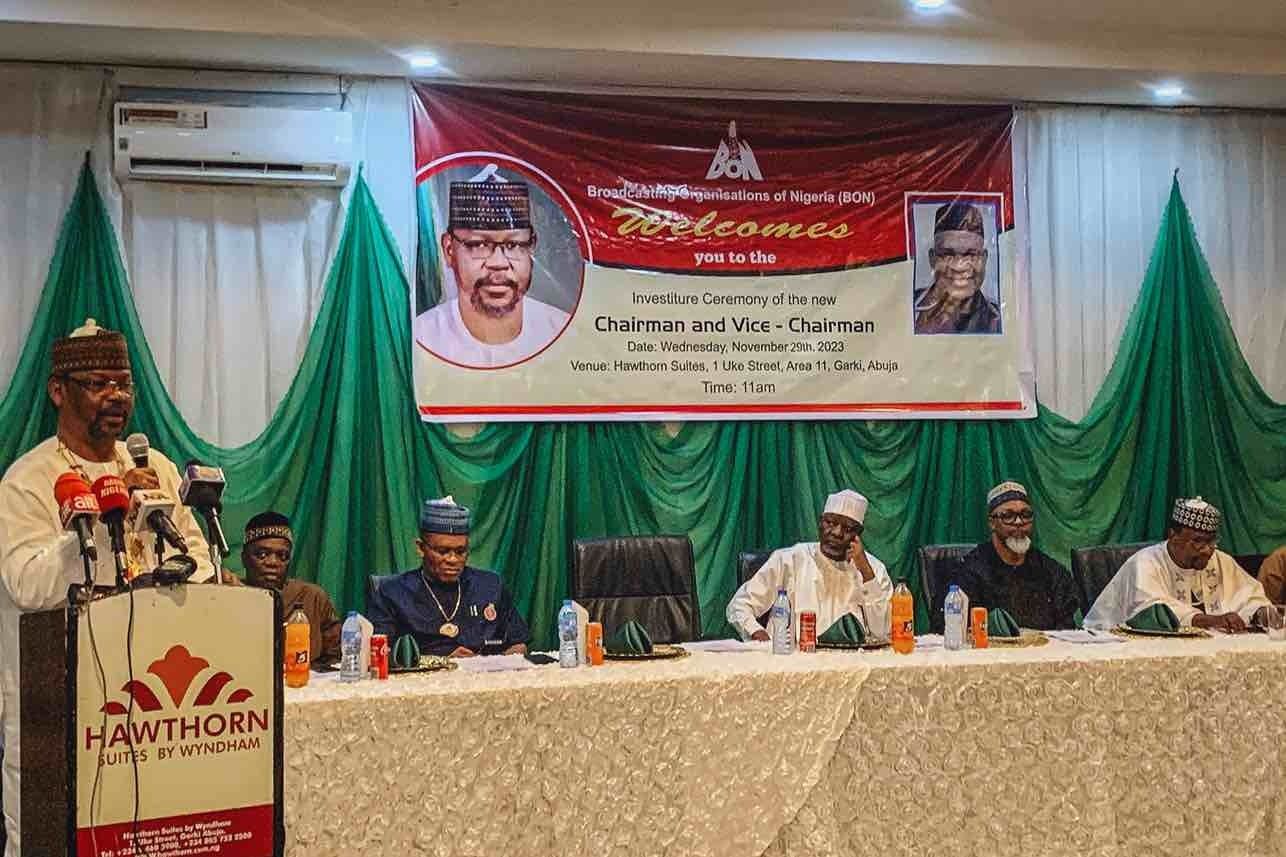
Salihu Abdulhamid Dembos makes his acceptance speech at the inauguration of the new leadership of BON in Abuja. Photographer: Samuel Okocha/234Digest
The Broadcasting Organisations of Nigeria (BON) has sworn in its new chairman and vice-chairman, who will face a number of challenges and opportunities in the country’s media sector. Here’s what they need to do to improve and transform the industry, and what potential investors should know.
Who are the new BON leaders?
Salihu Abdulhamid Dembos, the boss of the Nigerian Television Authority (NTA), and Chief Tony Akiotu, the chief executive of Daar Communications PIc, have taken over as the chairman and vice-chairman of the Broadcasting Organisations of Nigeria (BON), a group that represents the country’s broadcast media outlets. They were elected at BON's 78th general assembly in Abuja on October 12th and inaugurated at the same venue on November 29th.
Mr Dembos succeeds John Ugbe, who led BON for two years. In his speech, Mr Dembos thanked BON's members for their trust and vowed to build on Mr Momoh's achievements. He said he would work with all stakeholders to advance the interests of the broadcast media industry in Nigeria and ensure that BON remains a credible and influential voice in the media landscape. He also praised Mr Ugbe for his exemplary leadership and contributions to BON, adding that he would continue to seek his advice.
What are the challenges and opportunities in the Nigerian broadcasting sector?
The new leaders face a number of challenges and opportunities in the Nigerian broadcast media sector, which plays a vital role in the country's economy and society.
The sector has grown significantly since the deregulation in 1992, which allowed private players to enter the industry. Private broadcasting has promoted the country’s art and culture, created many jobs, and enhanced the quality and diversity of content and coverage. The sector has also contributed to the political development of the country, by providing platforms for objective and timely reporting and analysis.
However, the sector faces several challenges, including funding and sustainability. “Many member stations do not pay or are not up to date with the payment of annual membership fees,” said Mr. Ugbe during the inauguration ceremony of the new leadership of BON. He added that the indebtedness of member stations to BON stands at over 100 million naira (about $127,000). Other challenges include quality and accuracy, competition and regulation, media ownership and control, news commercialisation, and national integration and development. To overcome these challenges, the sector needs more investment, innovation, professionalism, and ethical standards to remain relevant and competitive in the changing media environment.
How can the new BON leaders improve and transform the industry?
The Nigerian broadcast media sector, which plays a vital role in the country’s economy and society, requires significant improvement and transformation. The new leadership of BON will have to address several challenges, including funding and sustainability, quality and accuracy, competition and regulation, media ownership and control, news commercialisation, and national integration and development. The new leaders will also have to leverage the opportunities that convergence and digital platforms offer, such as increased access and participation, greater creativity and innovation, and more diversity and choice. To ensure that the broadcast media achieves its full potential and serves the public interest, the new leaders will need to collaborate with all stakeholders, including the government, regulators, broadcasters, and civil society.
What should potential investors know about the Nigerian broadcast media sector?
The Nigerian broadcast media sector presents both opportunities and risks for potential investors at home and abroad.
On the one hand, the sector boasts a large and diverse market, with over 200 million people, many of whom are young and tech-savvy. The sector also has a rich and vibrant culture that can be tapped to create and distribute local content. Furthermore, the sector has a supportive policy framework, which aims to foster the growth and development of the industry.
On the other hand, the sector also faces some obstacles and uncertainties, which may deter or limit investment. According to the 2020 Investment Climate Statements by the U.S. Department of State, some of these factors include pervasive corruption, inadequate power and transportation infrastructure, high energy costs, an inconsistent regulatory and legal environment, insecurity, a slow and ineffective bureaucracy and judicial system, and inadequate intellectual property rights protections and enforcement. The report also cautions that the sector is subject to political interference and censorship, especially during elections and periods of unrest.
What is the Nigerian government doing to unlock investments?
The Nigerian government, led by President Bola Ahmed Tinubu, has initiated several measures to attract investments in the economy, including the broadcasting industry. These measures include the removal of a costly fuel subsidy, which is expected to release funds for investments in critical infrastructure, the overhaul of the power sector to enable more innovation and investments, and incentives to lure foreign capital.
The Tinubu administration has also committed to the Digital Switch Over (DSO) project, a government-led initiative aimed at transitioning Nigeria’s broadcasting sector from analogue to digital broadcasting. Nigeria’s Minister of Information and National Orientation, Mohammed Idris, has pledged to roll out a blueprint and expedite the implementation of the project across the country.
The successful completion of the DSO project is expected to benefit the Nigerian broadcasting industry, with improved quality and variety of programming, increased revenue generation, and enhanced viewer experience.

